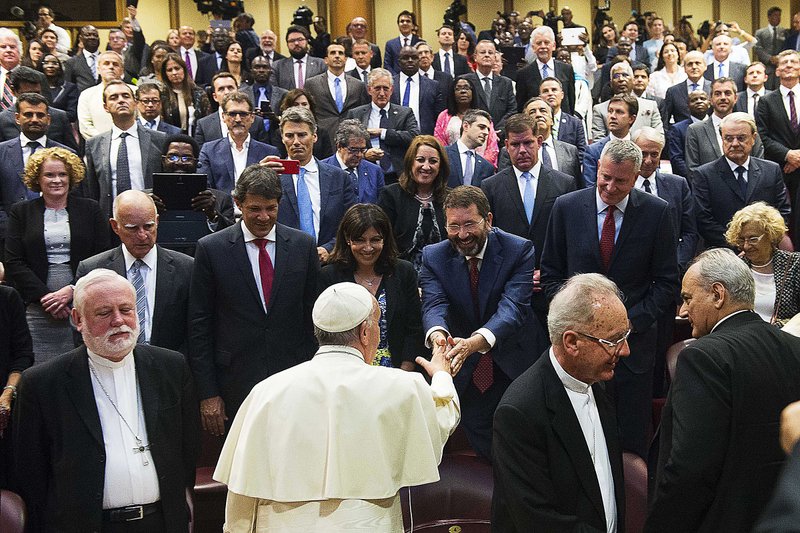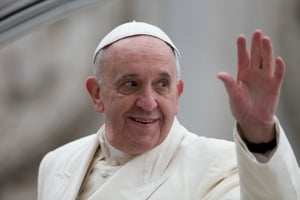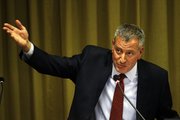VATICAN CITY -- Dozens of mayors from around the world demanded Tuesday that their national leaders take bold steps at climate talks in Paris this year, saying it could be the last chance to keep global warming to levels still safe for humanity.
One by one, some of the 60 mayors invited to a two-day Vatican conference lined up to sign a final declaration that says, "human-induced climate change is a scientific reality and its effective control is a moral imperative for humanity."
They were aiming to keep the pressure on world leaders ahead of the Paris negotiations in December. Pope Francis last month released an environmental encyclical that denounced what he called a fossil fuel-based world economy that exploits the poor and destroys the Earth.
Francis said at the gathering Tuesday that he had "a lot of hope" that the Paris negotiations would succeed, but also told the mayors: "You are the conscience of humanity."
Experts have long said cities are key to reducing global warming, because urban areas account for nearly three-quarters of man-made greenhouse-gas emissions. Mayor after mayor made individual pleas Tuesday at the conference for the world to change its ways.
Drawing rousing applause, California Gov. Jerry Brown denounced global warming deniers, who he said are "bamboozling" the public and politicians with false information to persuade them that the world isn't getting warmer.
Brown, a former Jesuit seminarian, urged the mayors to not be complacent in opposing climate-change deniers. California has enacted the toughest greenhouse-gas emissions standards in North America.
"We have a very powerful opposition that, at least in my country, spends billions on trying to keep from office people such as yourselves and elect troglodytes and other deniers of the obvious science," he said.
New York City Mayor Bill de Blasio announced new greenhouse-gas emissions targets for the Big Apple, committing the city to reducing its emissions 40 percent by 2030. He urged other cities to follow suit.
"The Paris summit is just months away," de Blasio said. "We need to see it as the finish line of a sprint and take every local action we can in the coming months to maximize the chance that our national governments will act boldly."
De Blasio is a founding member of an alliance of world cities that have committed to reducing emissions 80 percent by 2050 or sooner.
San Francisco Mayor Edwin Lee also announced new measures. He said the city that takes its name from the pope's nature-loving namesake, St. Francis of Assisi, would transition its municipal fleet of firetrucks, buses and trucks from petroleum diesel to renewable energy sources by the end of the year.
Stockholm Mayor Karin Wanngard said the Paris climate talks must take fossil fuels off the table and focus instead on renewable energy sources.
"Climate negotiators must dare to push boundaries and exclude fossil fuels as an option and reward solutions that are long-term sustainable and renewable," she said.
Stockholm is one of the world's leaders in using renewable energy sources, with 75 percent of the city's public transport network running on renewable energy. Wanngard's goal is to make the Swedish capital fossil fuel-free by 2040.
The conference's final declaration calls for financial incentives to transition economies from using fossil fuels to low-carbon and renewable energies and to shift public financing away from the military to "urgent investments" in sustainable development, with wealthy countries helping poorer ones.
And it says political leaders have a "special responsibility" at the Paris talks to approve a "bold climate agreement that confines global warming to a limit safe for humanity, while protecting the poor and the vulnerable from ongoing climate change that gravely endangers their lives."
The climax of Tuesday's session was the afternoon audience with Francis, who has become a hero to the environmental movement and has used his moral authority and enormous popularity to focus world attention on climate change and its effects on the poor.
Francis' other main priority has been to raise awareness about human trafficking, and the Vatican conference is aimed at showing how both are related. Francis said global warming often is responsible for creating "environmental refugees," who are forced to flee their homes because of drought or other climate-induced natural disasters and are then exploited.
Francis told the gathering that while he had high hopes about the Paris climate negotiations, he also wanted the United Nations to focus more on human trafficking.
"The United Nations has to deal with this," he said.
The Vatican is angling for the U.N.'s new Sustainable Development Goals, which are to be finalized in September, to make a solid reference to the problems of human trafficking and modern-day slavery.
"Addressing both these phenomenon, climate change and modern slavery, is a herculean task for us as city administrators," said Tony Chammany, the mayor of Kochi, India.


